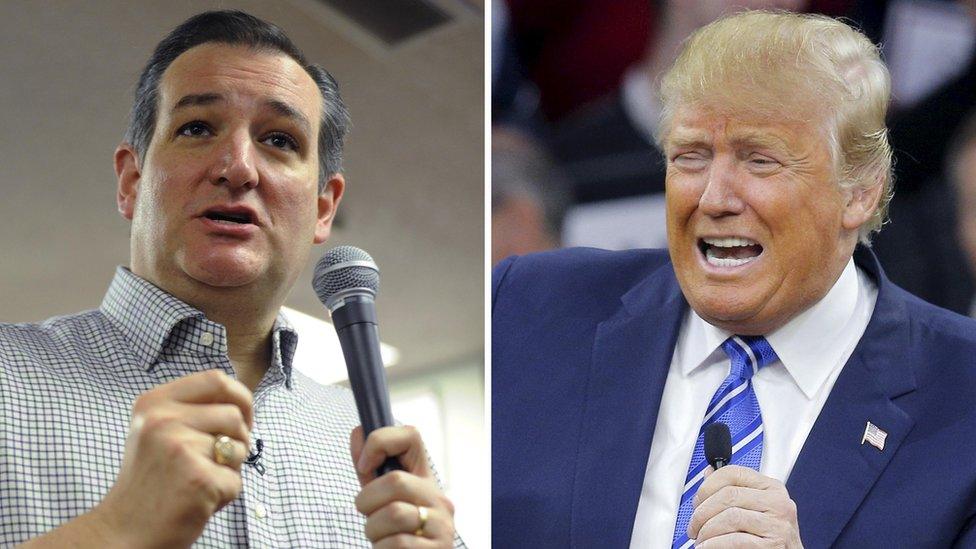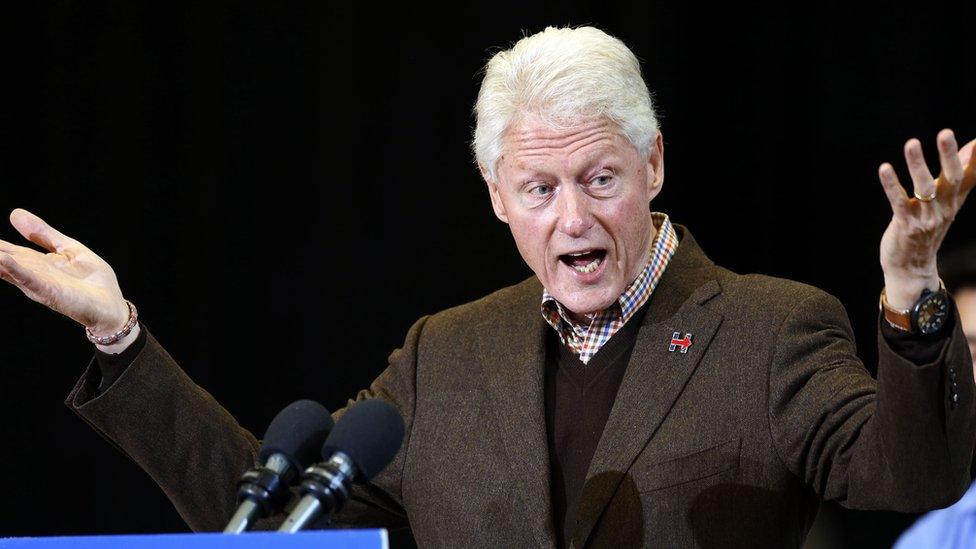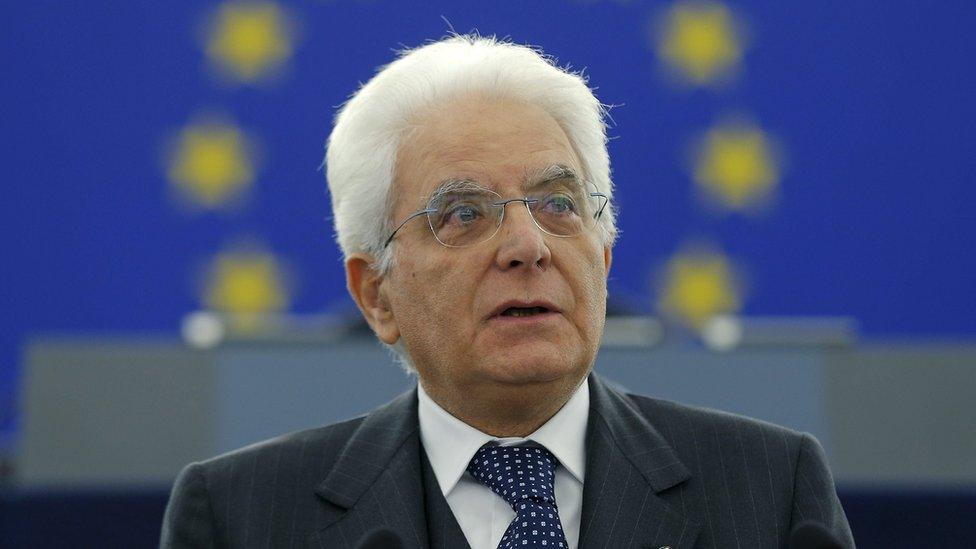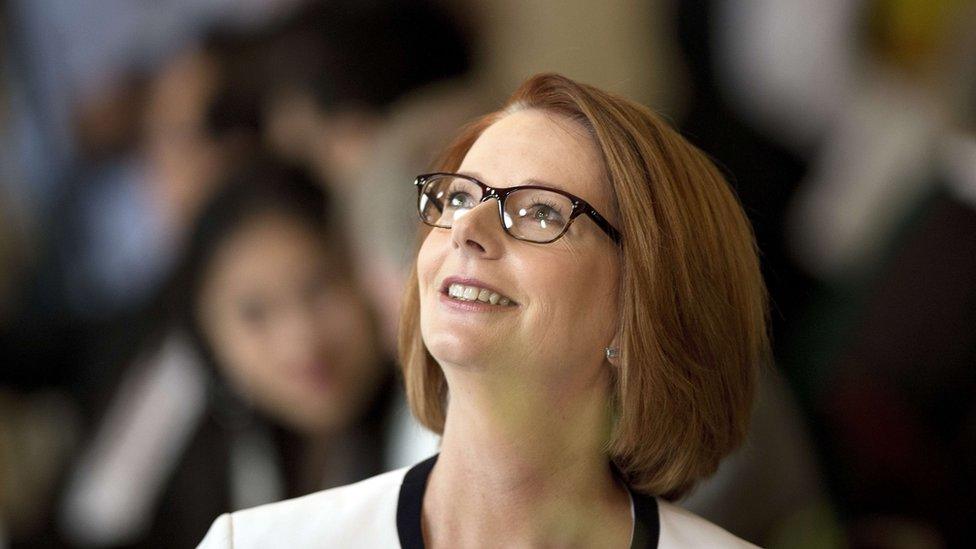Does it matter where a country's leader is born?
- Published

Republican presidential hopefuls Ted Cruz (left) and Donald Trump
Can you be born in Canada and become US president? And does it matter where you are born to become the president or prime minister of other countries?
Three prominent members of the Republican Party have raised the Canada question because Ted Cruz - one of the candidates for the party's presidential nomination - was born in Calgary, and the US constitution says a president must be a "natural born citizen".
Donald Trump asked the question whether the Republican Party wanted a candidate "who could be tied up in court for two years" trying to prove he was eligible.
Rand Paul, another rival candidate, joked that Cruz was "without question" qualified to be prime minister of Canada - though Cruz renounced his Canadian citizenship last year.
John McCain, the party's candidate in 2008, said there was a difference between being born on a US military base in Panama, as he was, and being born on "foreign soil".
Cruz himself says it's a "non-issue" because his mother is American and he moved to the US aged four. And it's true that most legal experts interpret "natural born citizen" as meaning born in the US or having one parent who is a US citizen.
The trouble, according to Rogers Smith, an expert in constitutional law at the University of Pennsylvania, is that the Supreme Court has never handed down a decision on the meaning of "natural born citizen".
It was this that enabled Donald Trump to lead a "birther" movement questioning whether Barack Obama was born in the US, which continued even after the president published his birth certificate (showing that he was born in Hawaii).
A US president must also be 35 years of age or older and have lived in the US for the past 14 years.
But what restrictions are placed on eligibility for the post of president or prime minister in other countries? Here are a few examples.
Birth
Rogers Smith says some countries have copied the phrase "natural born" from the US constitution.
"The most common pattern in Latin America is that a president must be either 'native born' or 'natural born'," he says.
A search for the phrase "natural born citizen" in the 194 constitutions on the Constitute Project website brings up, rather surprisingly, Bhutan and the Philippines.
Mexico's constitution, meanwhile, requires its presidents to be "Mexican by birth".
But many countries in Europe don't have a problem with foreign-born citizens becoming president or PM. In the UK, for example, you have to be a citizen of the UK, the Republic of Ireland or the Commonwealth, and over 18, to be an MP. The only requirements for being PM are to be able to command the confidence of the House of Commons and be invited by the Crown to form a government.
So if Cruz had kept his Canadian passport he could have run for parliament in the UK and, with a lot of luck he might have become prime minister.
Parentage/Family
In 2014 Zambia's vice-president Guy Scott became interim president after the president died, but he wasn't eligible to do the job permanently because his parents were English and Scottish immigrants - and under the constitution both have to be Zambians by birth or descent.

The Irish are much more relaxed, but as Bill Clinton learned, external when he incorrectly said in 2012 that he could run to be president, Irish law requires people who run for president have to have one grandparent who was an Irish citizen at the time of birth.
Age
On average, constitutions set a minimum age of 35 to become a president or prime minister, according to to Tom Ginsburg, a professor of international law at the University of Chicago - and this, again, is because many constitutions were modelled on the US's.
When the US constitution was drafted, life expectancy for 20-year-old males was about 46 years, so someone aged 35 was regarded as experienced. More than two centuries later, average life expectancy for American men and women is 78, but the original age threshold remains unchanged.

Italian President Sergio Mattarella is 74 years old
Age requirements vary considerably around the world, though. In France and the UK people are eligible from age of 18. In Brazil it's 35, in Germany, 40. But you do not become eligible to be Italy's president until the age of 50.
Religion
In 2014, Pew Research, external found 30 of the world's countries call for their heads of state to have a particular religious affiliation.
Lebanon requires its president to be a Maronite - the largest Christian community in the country - and its prime minister to be a Sunni Muslim.
Iran, Jordan, Malaysia, Morocco, Pakistan, Saudi Arabia and Syria all require the head of state to be Muslim by law. The King of Thailand, meanwhile, must be Buddhist.
In Tunisia, any Muslim male or female voter born in the country may qualify as a candidate for president. In Myanmar (Burma) and Costa Rica, the president is prohibited from being a member of a religious order.
Pew placed 19 countries with a "ceremonial monarch" in a separate category. It pointed out that 16 countries - all members of the Commonwealth - have the British monarch as their head of state (and since Henry VIII the British monarch has also been the head of the Church of England). The monarchs of Denmark, Norway and Sweden are also subject to religious requirements.
Length of citizenship
In about one in seven countries someone is only eligible to become head of state or government after being a citizen for a specified number of years, says Ginsburg.
However, many countries have laws on nationality and citizenship which may mean that it takes years for an immigrant to become a citizen in the first place, he adds.
"Statutory law varies from country to country - it could be five years, it could 10 years, there might be no time limit and it might just depend on how long it takes. A country's openness to immigration makes a huge difference," he says.
Examples

Julia Gillard was Australia's first female prime minister
Plenty of people have been born in one country and come close to governing in another, or actually achieved the feat.
Senegalese-born Segolene Royal, the child of a French artillery officer, ran unsuccessfully for the presidency in 2007.
Julia Gillard, born in Wales, was the prime minister of Australia from 2010 to 2013.
Golda Meir, originally from Kiev, served five years as the prime minister of Israel from 1969, and Shimon Peres, Israeli president between 2007 and 2014, was born in a village that was Polish at the time, and is now in Belarus.
Valdus Adamkus, became president of Lithuania in 1998 while he was still an American citizen (though he later gave up his American citizenship). The current president of Estonia, Swedish-born Toomas Ilves, also grew up in the US though renounced his US citizenship three years before becoming Estonia's foreign minister - and 13 years before ascending to the presidency.
Correction 11 January 2016: This story has been amended to remove an incorrect reference to Japanese citizenship.
Subscribe to the BBC News Magazine's email newsletter to get articles sent to your inbox.